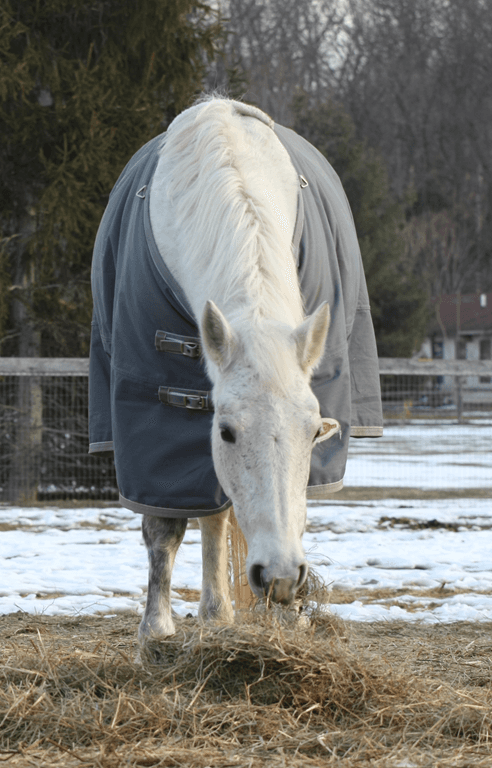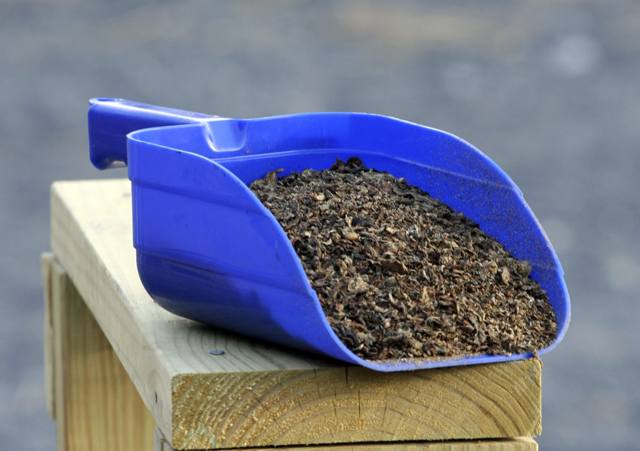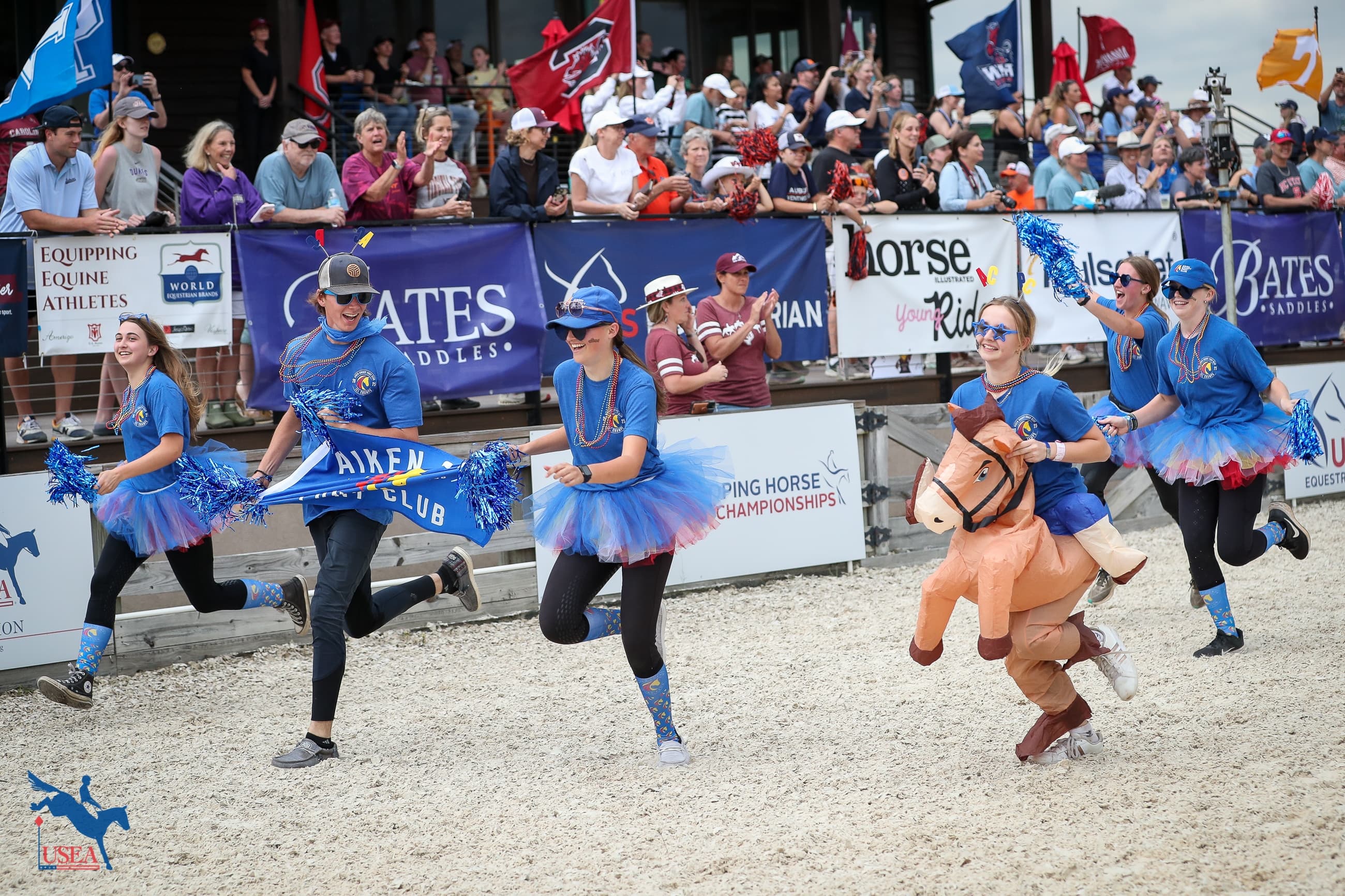Nutrition: Myths, Misconceptions, and Common Questions

The Basics:
The horse’s diet can be broken down into two major groups, forage and concentrates. The bulk of the diet should be forage which includes hay and pasture. There are several types of hay including grass, alfalfa, timothy, and mixed. It is important to make sure that your hay smells fresh and is free from dust and mold. In order to assess the nutrient content, you must have it analyzed. If your horse has difficulty chewing hay, you can also provide forage in the form of cubes (MUST be soaked to prevent choke), pellets, and chopped hay. Pasture is an important form of forage if your horse’s metabolism can tolerate it.
Concentrates come in many forms such as sweet feed, pellets, chunks, and extruded feeds. Pelleted feeds are processed so that they are more easily digestible than a basic sweet feed. Chunks are larger which makes them good for horses fed on the ground—the size of each piece discourages intake of dirt when eating. Extruded feeds are processed even further than pelleted feeds; again, making them more easily digestible. When choosing a concentrate, it is important to consider the fat, fiber, and protein content of the feed. These values are easily accessible on the feed tag. It is also important to consider the starch/NSC content and caloric value per pound. You will need to contact the manufacturer for this information.
Common Questions:
Q: How much should I feed?
A: Your horse should eat approximately 1-2% of their body weight in TOTAL feed per 24 hours. This works out to 10-20 pounds per day for the average 1000# horse. Remember, this includes grain, hay, and pasture. On average, a horse on good pasture consumes about 1 pound of grass per hour. All amounts must be adjusted pending your horse’s metabolism and work level.
Q: My horse is getting older. Should I switch to a senior feed?
A: Not necessarily. “If it ain’t broke, don’t fix it.” In other words, if your horse is healthy and maintaining good body condition, there is no need to change his diet. However, if he is having trouble chewing hay and taking in forage, you may need to switch to a complete feed such as Senior. Complete feeds are very high in fiber and are formulated to be fed as the entire diet. This does not mean that the horse cannot have hay in
addition to senior. It does mean that, overall, senior diets are typically lower in calories and should be fed in larger volumes. Therefore, your horse may need 10-20+ pounds of senior daily to maintain his body
condition.

Q: What type of salt supplement is best? Traditional white, Himalayan, or mineral (red)?
A: This actually just depends on what your horse prefers. It is important to offer a salt supplement because many horses crave salt and consuming it encourages water intake. Some horses may also prefer loose mineral vs. salt or mineral blocks.
Q: Does any specific type of feed cause colic?
A: No. The most common cause of colic is diet CHANGE. Therefore, make sure that you make any changes gradually over 1-2 weeks. This includes when you get a new load of hay—even if it’s from the same supplier and field. Save a few bales and gradually mix the flakes over about a week.
Q: What types of feeds make my horse “hot”?
A: Contrary to popular belief, protein does not make your horse extra excitable. Starch or sugar in the diet is actually to blame for increasing this type of behavior. This is similar to a child on a “sugar high”. If you have “hot” horse, look for feeds that are marketed as LOW starch. Talk to your veterinarian about specific feed
recommendations for your horse.
Q: Why does my horse eat manure?
A: We don’t know exactly why some horses eat manure and/or dirt. If you notice that your horse is eating manure, talk with your veterinarian to confirm that the horse is receiving a balanced diet. Boredom can cause several bad habits, so make sure that your horse has plenty of access to forage as well.
Q: Do I need to feed more grain in the winter to help keep my horse warm?
A: No. HAY provides fuel to the colon or “internal furnace”. The average horse should consume 1/2-1 bale of hay per day in the winter time to meet his caloric and “warming” needs. Some thin horses may need to be blanketed in the winter as well. Discuss your horse’s specific needs with your veterinarian.
Q: My horse’s body condition is just right on hay and pasture alone. Do I need to add grain into his diet?
A: Not technically. Hay and pasture should meet all of his nutritional needs. However, if you are going to add grain, choose a vitamin/mineral “balancer” pellet. This is a low-calorie way to ensure that the diet is balanced.
Q: Why are some feeds more expensive than others?
A: At HVA, we tend to recommend the large, reputable feed companies, These companies put time and money into extensive nutritional research. They use good quality ingredients and have intensive quality control. Furthermore, they have excellent reputations to uphold. All of these characteristics, especially the ingredient quality, cause their feeds to be marginally more expensive. This is a cost difference that we think is well worth it. As the old adage goes, “you get what you pay for…”
Q: Is it okay to feed round bales?
A: Yes! Round bales can be an economical way to provide plenty of free-choice forage to your horse. If you are going to use round bales, make sure to purchase them from a source that is reputable. Inspect and smell the hay to ensure that it is free from dust and mold, just as you would small, square bales. You should do this every day or two, as the quality can differ as the horse eats through the bale. In addition, you may consider a feeder, such as a Hay Hut, to help keep the hay from getting wet and being wasted. Finally, you may want to consider vaccinating for Botulism if your horse will be eating round bales.
Take Home Messages:
- There are lots of different feed types. Consult with your veterinarian to figure out what is best for your horse.
- Every horse is different! We must make adjustments pending metabolism and activity level.
- BCS and weight-taping can help you be objective when assessing your horse’s condition.
- We all have questions! Just ask!
About the Author
Dr. Erin K. Dill received her bachelor of science degree from West Virginia University. From there, she went on to veterinary school at the University of Georgia. Dr. Dill graduated in the spring of 2007 and then completed an Equine internship at the University of Missouri. Her veterinary interests include lameness, sport horse medicine, neonatal care and dentistry. She has also been an avid rider and instructor throughout her college years in the hunter/jumper circuit. In her free time she enjoys riding her horse Enzo and spending time with her husband, Dr. Jeff Dill, their two dogs, Olive and Charlie, and their new addition Fiona the cat. Dr. Dill currently works with Henderson Veterinary Associates in Elizabethtown, PA.














